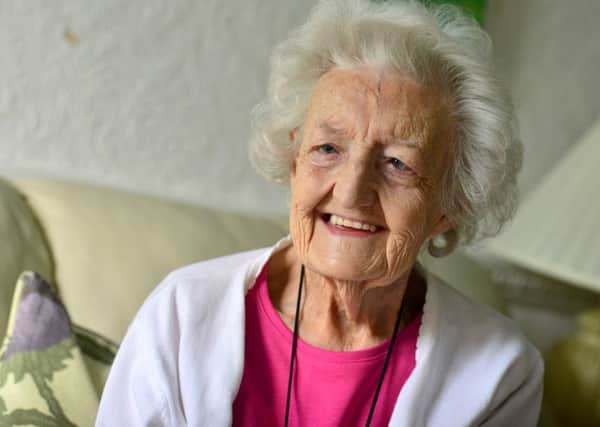Reader’s story: Alison O’Dowd on her afternoon with her pal Maureen


Her home in Birstall’s Brontë Road is warm like her welcome. I visit often and as we sit down to chat I look forward, once again, to being immersed in the past.
Today Maureen speaks of ‘the evacuees’ – Maurice, Brian and their sister, also Maureen, who came to live with her and her aunt in Yorkshire during World War Two. Maurice and his siblings had left their parents and home in London behind for the one up, one down in Bradford.
Advertisement
Hide AdAdvertisement
Hide AdOrphaned at eight, Maureen was provided with a happy home by her aunt. “She loved me like I was her own,” says Maureen. “She was widowed when my uncle died of a heart attack. He was a miner and he worked in the coal pits. They gave him the sack for starting a union.”
I can see the indignation in Maureen’s wrinkled face as she recounts these facts. Her recall is astonishing for someone of her years. She tells me the tales of her childhood, impressing upon me the freedom experienced in the summer months. Full days spent in the fields entirely unsupervised: leaving home and returning with the rise and fall of the sun. Unimaginable for my generation.
Maureen’s schooling ended when she went to work in the textile mill she colourfully refers to as ‘the black hole of Calcutta’. She looks sad when she explains why she didn’t continue her studies.
“Auntie wanted me to go to Notre Dame Art College; I loved to paint and I did have talent”: the walls of Maureen’s home bear testament to this fact. “But I thought I had to work, I thought I had to contribute. I realise now I should have gone but at the time I felt such a sense of responsibility to my aunt and I insisted on paying my way. I should have listened to her, because really she would have loved for me to pursue any dream I had.”
Advertisement
Hide AdAdvertisement
Hide AdMaureen’s regret is palpable. I look around the room at all the artwork displayed proudly and I too think it’s a shame she didn’t follow that particular path.
The war brought long days for Maureen. Getting to and from work at the factory where her engineer brother made bomb casings involved long bus journeys and miles of walking every day.
“I used to leave the house at 5am and not get back until after nine at night. I still remember how tired I was.”
Following this, Maureen went to work at Lancaster aeroplanes; she was also recruited as a firefighter. During WWII firefighters went out at night, alerted by sirens, to extinguish fires caused by incendiary devices. Maureen giggles with a twinkle in her still clear blue eyes: “All we had with us was a stirrup pump and a bucket of water so what we were supposed to do in the event of a proper fire I don’t know.”
Advertisement
Hide AdAdvertisement
Hide AdOn a personal level, by far the most important aspect of the war for Maureen was the arrival of the evacuees. Maurice, Brian and the other Maureen –12, 10 and six respectively – became family over the course of a year. In fact, Maurice didn’t want to leave when the time came to return home.
Maureen tells me that circa 1975 Maurice was one of the first people she spoke to on her brand new telephone. They had been corresponding by mail up until that point and she shows me a collection of letters she has kept safe all these years. It’s clear from talking to Maureen that the evacuees were like the younger siblings she never had. The contact they shared throughout their lives has clearly brought her much joy. Holidays, weddings and more recently Maureen’s ninetieth birthday celebrations all enhanced by the presence of ‘the evacuees’.
The phone rings and it’s my cue to leave. I think about how much people thrown together in the strangest of circumstances can enrich each others lives and how much I’ve learned from having Maureen, the grandmother of my partner, in my life.